Editor's Note:
As we approach the milestone of Fudan University’s 120th anniversary, we are thrilled to introduce a special series titled International Voices at Fudan. This collection of narratives, aims to celebrate the rich tapestry of experiences that have shaped the university's recent evolution and growth.
Through the personal stories of our diverse community members, we will explore how Fudan has not only adapted to the global stage but has also flourished as a hub of intellectual exchange and cultural diversity. Each story is a testament to the university's commitment to fostering an inclusive environment where students and faculty from around the world can learn, grow, and pursue their aspirations.
In these pages, you will meet individuals who have traversed geographical and cultural boundaries to find a home at Fudan. Their stories will reveal the transformative power of education and the unique ways in which Fudan has influenced their lives. From academic achievements to personal growth, from cultural integration to career development, each narrative is a beacon of the university's global impact.
The brain, with its network of over 10 billion neurons, is undeniably the most vital organ in our body, shaping our emotions, driving our actions, and anchoring our very existence. For Professor Nashat Abumaria, Principal Investigator at Fudan’s Institutes of Brain Science (IOBS), unraveling the mysteries of the brain has been a true passion of his research.
From a pharmacist to a researcher
Initially trained as a pharmacist at the University of Jordan, where the medical system requires pharmacists, rather than doctors, to prescribe drugs for patients, Abumaria was certain that there would be a drug for every disease. However, during his clinical internship, Abumaria observed that individuals grappling with depression, especially when it was exacerbated by anxiety, often found the treatments available to be inadequate, largely due to a lack of comprehensive understanding of these disorders. This realization spurred him to embark on a PhD journey in neuroscience at the University of Göttingen, where he joined the International Max-Planck Research School of Neuroscience; a program under the deanship the Nobel laureate Erwin Neher.
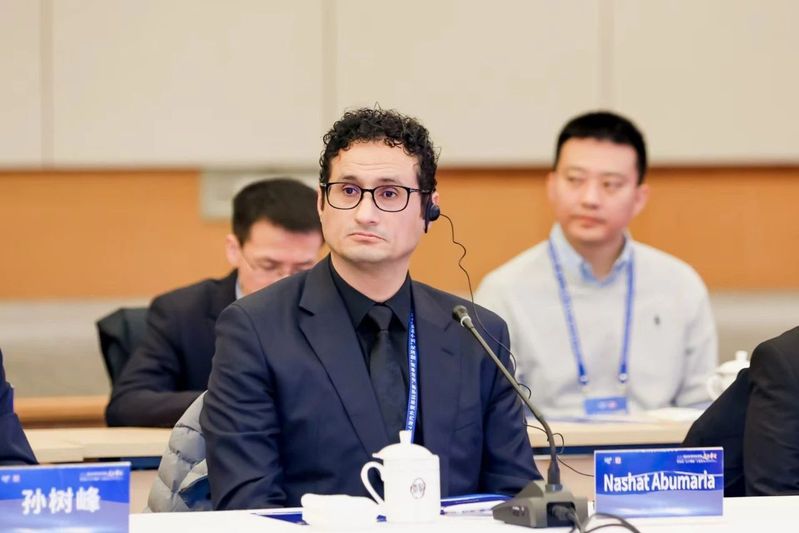
Prof. Nashat Abumaria attended the Young Scientist Forum in Fengxian, Shanghai
In medical research, identifying the right animal model is crucial for delving into the disease mechanisms of many neurological disorders. During his postdoctoral training at the German Primate Center, he dedicated himself to the development of animal models for depression. Looking back on his time there, Abumaria acknowledges the experiences as instrumental in honing his expertise as a behavioral specialist and in laying the critical foundation for his subsequent research endeavors.
In 2007, Abumaria joined Tsinghua University, concentrating on synaptic plasticity and cognitive function mechanisms. Synapses act as bridges between neurons, facilitating information transmission. Just as real-life bridges are adapted to meet the evolving demands of transportation, synaptic plasticity refers to the dynamic process of strengthening or weakening synapses in response to experience, a phenomenon often observed in people’s learning process. Abumaria’s research shed light on the pivotal role of synaptic plasticity in the formation of fear memories. In collaboration with Nobel laureate Susumu Tonegawa, Abumaria contributed to the development of a novel compound designed to bolster learning capabilities. This breakthrough subsequently advanced into clinical trials in the United States, marking a significant step toward enhancing human cognition.
Continuing his research in Fudan
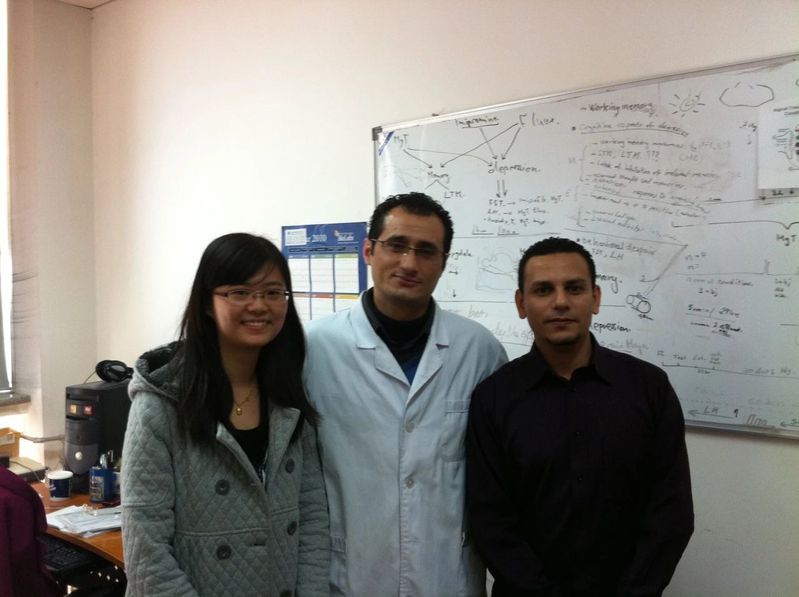
Abumaria served as Postdoc Researcher and Associated Professor at Tsinghua University between 2007-2015
Abumaria joined IOBS in 2015. Looking back, he considers that decision to have been a natural step forward in his professional journey. “Fudan University boasts top neuroscience minds and has affiliated hospitals like Huashan and Zhongshan, which offer exceptional support for neurological research,” he shared. At Fudan University, Abumaria started his own lab called the Laboratory for Emotions and Cognition. Leveraging his diverse background and expertise in behavioral models and synaptic plasticity, he aimed to use his research to explore complex, often uncharted areas in neuroscience, especially those surrounding motivation and resilience.
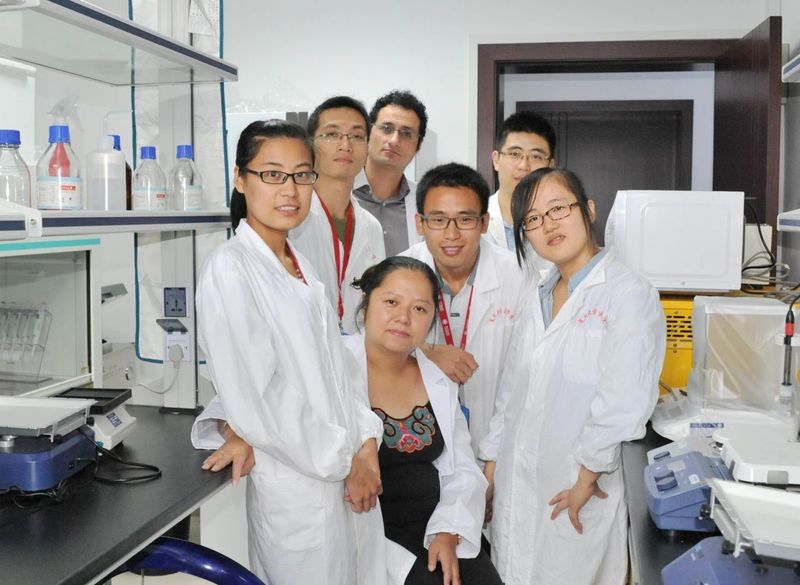
Prof. Nashat Abumaria and his team at IOBS in 2015
In neuroscience, exploring the mechanisms behind behavior has always been an intriguing question. In our daily lives, we all experience challenges and obstacles: a poor grade may push someone to try harder the next academic year, or critical feedback on a manuscript often requires better revisions. So, we keep trying to do better. However, when failures accumulate, some individuals may simply stop trying, in a process often called “giving up.” This common but complex behavioral shift involves neural mechanisms that mediate the transition from action to inaction. Understanding this process remains a largely unexplored frontier in neuroscience, primarily due to the lack of suitable animal models capable of replicating such behaviors. Given his expertise in developing behavioral models, Abumaria believed his lab could help bridge this gap in research.
Along with his team, he developed two animal models to study this behavioral shift, one involved repeated foot shocks and another, inescapable swimming sessions for mice. Initially, the mice tried to escape these adverse stimuli, but after three days, they ceased their attempts. Animals’ behaviors were then recorded, categorized, and mathematically analyzed. Utilizing these animal models, they identified a neural circuit that reduces GABAergic activity, which facilitates the transition to no-action. This groundbreaking research, which bridged a significant gap in the availability of suitable animal models for behavioral transition studies, was published in Neuron, a preeminent journal within the neuroscience community. Abumaria’s discoveries also received positive feedback from the scientific community. Traditionally, scientists have relied on models of learned helplessness in rodents to study depression, where rodents cease trying when they perceive no possibility of escape. Abumaria’s new study, however, highlights that in certain adverse situations, giving up may represent a strategic decision rather than mere helplessness.
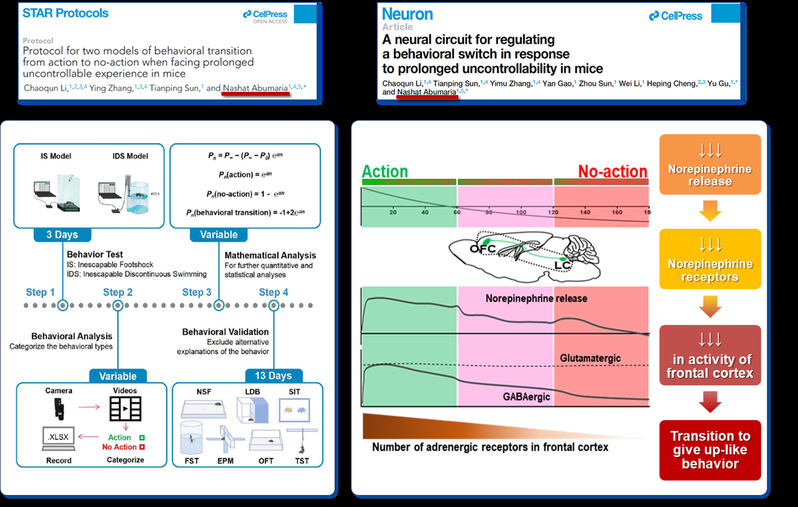
Abumaria and his team developed new animal models for “give-up”
While his work on behavioral models has advanced understanding of the “give-up” response, Abumaria’s passion for synapses remains undiminished. The transient receptor potential melastatin-like 7 (TRPM7) channel, which transports ions like zinc (Zn2+), magnesium (Mg2+), and calcium (Ca2+), is frequently studied in relation to neuronal death. Abumaria’s team, however, further explored TRPM7’s role in Alzheimer’s disease (AD), a condition affecting nearly 17 million people in China. Contrary to traditional views, they found that TRPM7 does not regulate Mg2+ and Zn2+ in active neurons, and TRPM7 levels are reduced in Chinese cohort of AD patients. The work on TRPM7 made the cover story of Cell Reports, a leading journal for life sciences. Their discoveries of the role of TRPM7 in the pathogenesis of AD was reported and highlighted in Science Signaling. Currently, Abumaria is working with pharmaceutical industry to explore a therapeutic option based on this research.
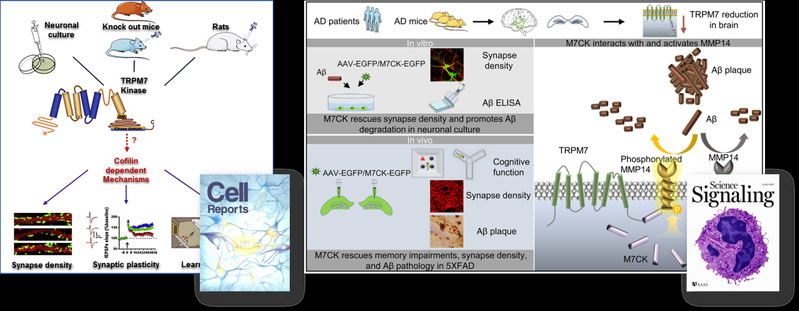
Abumaria’s works on TRPM7 unveiled new therapeutic option for AD
Life in Fudan’s IOBS as a researcher and teacher
The year of 2025 marks a milestone for both Fudan University, as it celebrates its 120th anniversary, and for Abumaria, who is commemorating his 10th year at IOBS this year. Reflecting on this period, he expressed pride and joy, noting, “The past decade has been remarkable. I never imagined I’d make even one discovery of this magnitude, let alone two.” His development of the “give-up” animal model provides the scientific community with better tools to explore the mechanisms behind this behavior, while his work on TRPM7 offers new insights into one of the most challenging neurological disorders. Abumaria expressed his gratitude for the steadfast support from his colleagues, with special mention of Professor MA Lan, the director of IOBS and an academician of the Chinese Academy of Sciences.
Nestled near the vibrant Xujiahui business district, Fudan’s Fenglin Campus serves as a hub for biomedical research. Abumaria praises its infrastructure and state-of-the-art experimental instruments. The IOBS and the Institutes of Biomedical Sciences (IBS) are linked by a convenient underground passage. With a touch of humor, Abumaria remarks, “I can walk over to use IBS equipment with a coffee in hand, and it won’t even have cooled down by the time I arrive.”
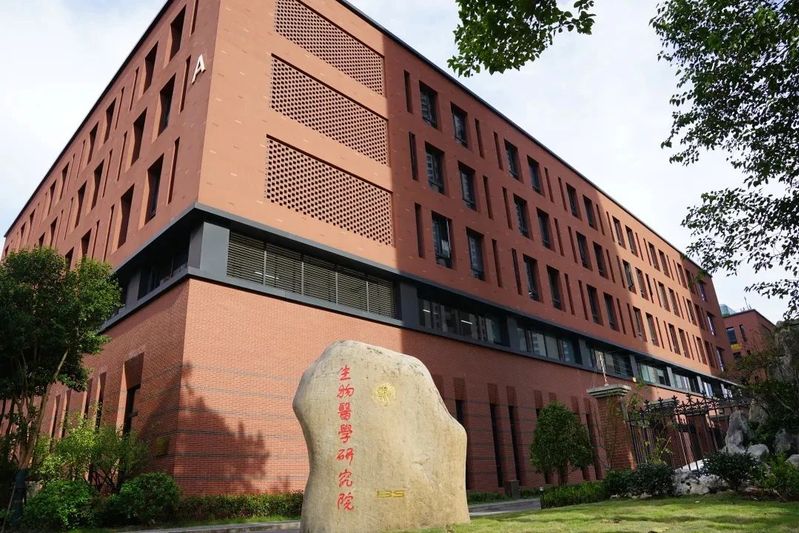
Research Building A & B at Fenglin Campus, home to IOBS and IBS
Nowadays, as a PhD supervisor, Abumaria has his own understanding on how to run a lab. Abumaria values self-motivation, saying, “I never check on whether students have arrived or not.” Instead, he discusses their academic goals, encouraging them to pursue research topics they are passionate about, “I never let anyone dictate my path; I persist in whatever I set my mind to.”
Looking ahead, Abumaria is committed to furthering his research, hoping to unlock even more insights into the brain’s complexity and to train a new generation of neuroscientists who will continue the work he has started. His journey, from a curious pharmacist in Jordan to a top-notch neuroscientist in the world, stands as a testament to the power of perseverance and passion in science.

Prof. Nashat Abumaria and his current lab members
